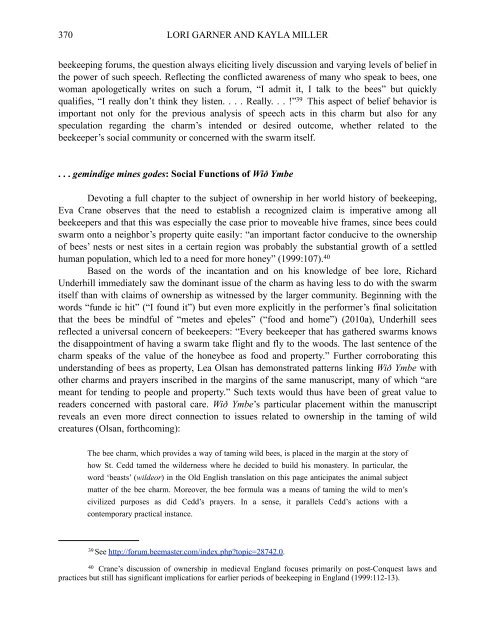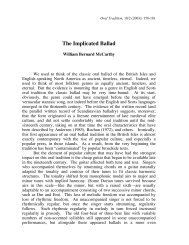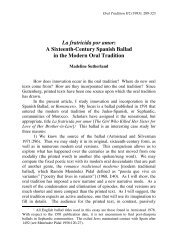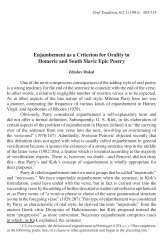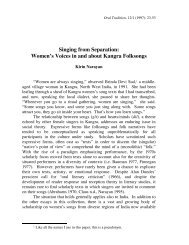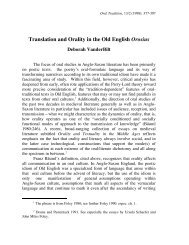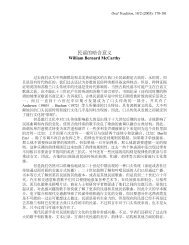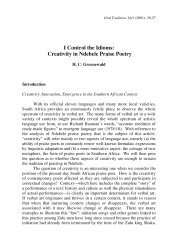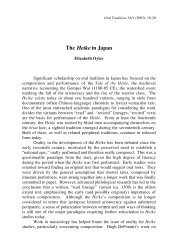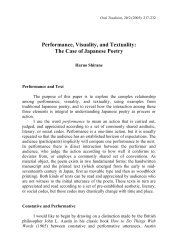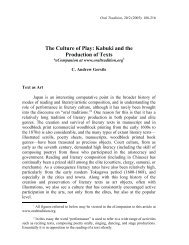Garner and Miller - Oral Tradition Journal
Garner and Miller - Oral Tradition Journal
Garner and Miller - Oral Tradition Journal
You also want an ePaper? Increase the reach of your titles
YUMPU automatically turns print PDFs into web optimized ePapers that Google loves.
370 LORI GARNER AND KAYLA MILLER<br />
beekeeping forums, the question always eliciting lively discussion <strong>and</strong> varying levels of belief in<br />
the power of such speech. Reflecting the conflicted awareness of many who speak to bees, one<br />
woman apologetically writes on such a forum, “I admit it, I talk to the bees” but quickly<br />
qualifies, “I really don’t think they listen. . . . Really. . . !” 39 This aspect of belief behavior is<br />
important not only for the previous analysis of speech acts in this charm but also for any<br />
speculation regarding the charm’s intended or desired outcome, whether related to the<br />
beekeeper’s social community or concerned with the swarm itself.<br />
. . . gemindige mines godes: Social Functions of Wið Ymbe<br />
Devoting a full chapter to the subject of ownership in her world history of beekeeping,<br />
Eva Crane observes that the need to establish a recognized claim is imperative among all<br />
beekeepers <strong>and</strong> that this was especially the case prior to moveable hive frames, since bees could<br />
swarm onto a neighbor’s property quite easily: “an important factor conducive to the ownership<br />
of bees’ nests or nest sites in a certain region was probably the substantial growth of a settled<br />
human population, which led to a need for more honey” (1999:107). 40<br />
Based on the words of the incantation <strong>and</strong> on his knowledge of bee lore, Richard<br />
Underhill immediately saw the dominant issue of the charm as having less to do with the swarm<br />
itself than with claims of ownership as witnessed by the larger community. Beginning with the<br />
words “funde ic hit” (“I found it”) but even more explicitly in the performer’s final solicitation<br />
that the bees be mindful of “metes <strong>and</strong> eþeles” (“food <strong>and</strong> home”) (2010a), Underhill sees<br />
reflected a universal concern of beekeepers: “Every beekeeper that has gathered swarms knows<br />
the disappointment of having a swarm take flight <strong>and</strong> fly to the woods. The last sentence of the<br />
charm speaks of the value of the honeybee as food <strong>and</strong> property.” Further corroborating this<br />
underst<strong>and</strong>ing of bees as property, Lea Olsan has demonstrated patterns linking Wið Ymbe with<br />
other charms <strong>and</strong> prayers inscribed in the margins of the same manuscript, many of which “are<br />
meant for tending to people <strong>and</strong> property.” Such texts would thus have been of great value to<br />
readers concerned with pastoral care. Wið Ymbe’s particular placement within the manuscript<br />
reveals an even more direct connection to issues related to ownership in the taming of wild<br />
creatures (Olsan, forthcoming):<br />
The bee charm, which provides a way of taming wild bees, is placed in the margin at the story of<br />
how St. Cedd tamed the wilderness where he decided to build his monastery. In particular, the<br />
word ‘beasts’ (wildeor) in the Old English translation on this page anticipates the animal subject<br />
matter of the bee charm. Moreover, the bee formula was a means of taming the wild to men’s<br />
civilized purposes as did Cedd’s prayers. In a sense, it parallels Cedd’s actions with a<br />
contemporary practical instance.<br />
39<br />
See http://forum.beemaster.com/index.php?topic=28742.0.<br />
40<br />
Crane’s discussion of ownership in medieval Engl<strong>and</strong> focuses primarily on post-Conquest laws <strong>and</strong><br />
practices but still has significant implications for earlier periods of beekeeping in Engl<strong>and</strong> (1999:112-13).


